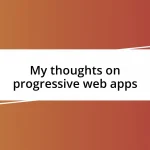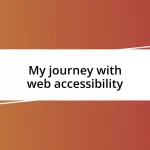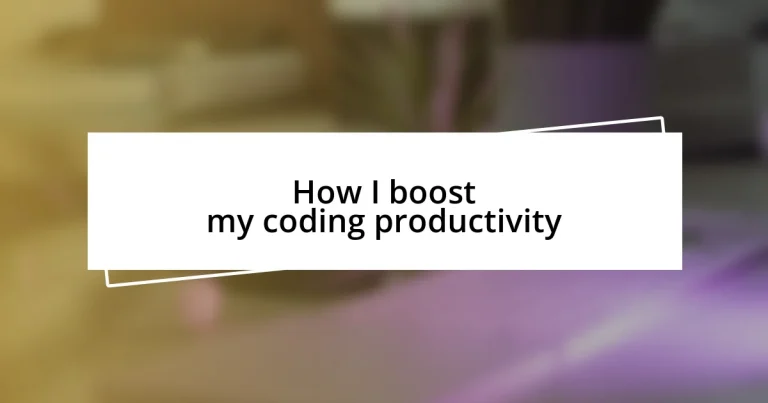Key takeaways:
- Coding productivity is focused on quality and user impact rather than just quantity; understanding user needs enhances effectiveness.
- Identifying roadblocks such as distractions, overcommitting, and unclear requirements is crucial for maintaining productivity and achieving goals.
- Regularly reviewing and adjusting strategies fosters continuous improvement and helps adapt to evolving challenges in coding.
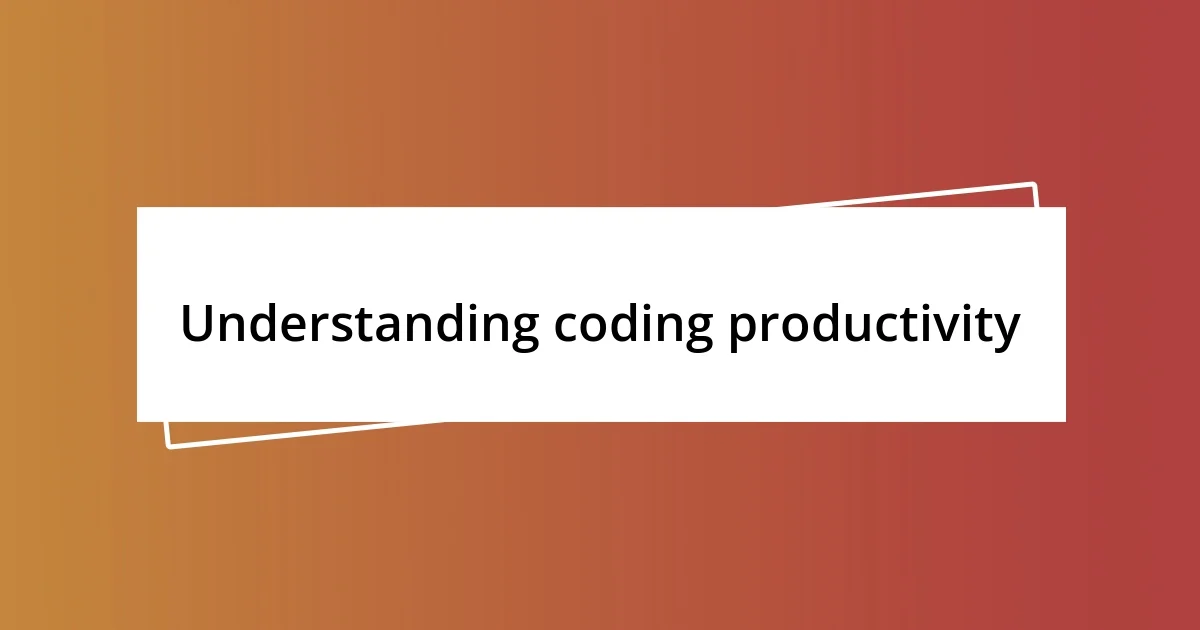
Understanding coding productivity
Coding productivity isn’t just about how many lines of code you write; it’s about the quality and impact of that code. I’ve had days where I pushed out a dozen features, but if they didn’t solve real problems, what was the point? It’s this realization that prompted me to focus more on understanding user needs than merely checking tasks off my list.
I remember one particularly challenging week when I felt overwhelmed. I had multiple deadlines looming, and instead of rushing through my work, I took a step back to assess my priorities. This shift in perspective allowed me to tackle each task with clarity and intention. Have you ever noticed how the right mindset can transform your productivity?
Additionally, using tools to track my progress has been invaluable in my coding journey. I’ve experimented with various methods—from simple to-do lists to sophisticated project management software. I find that keeping a visual representation of my workflow often motivates me to stay on track. How does your workflow visualization help you?
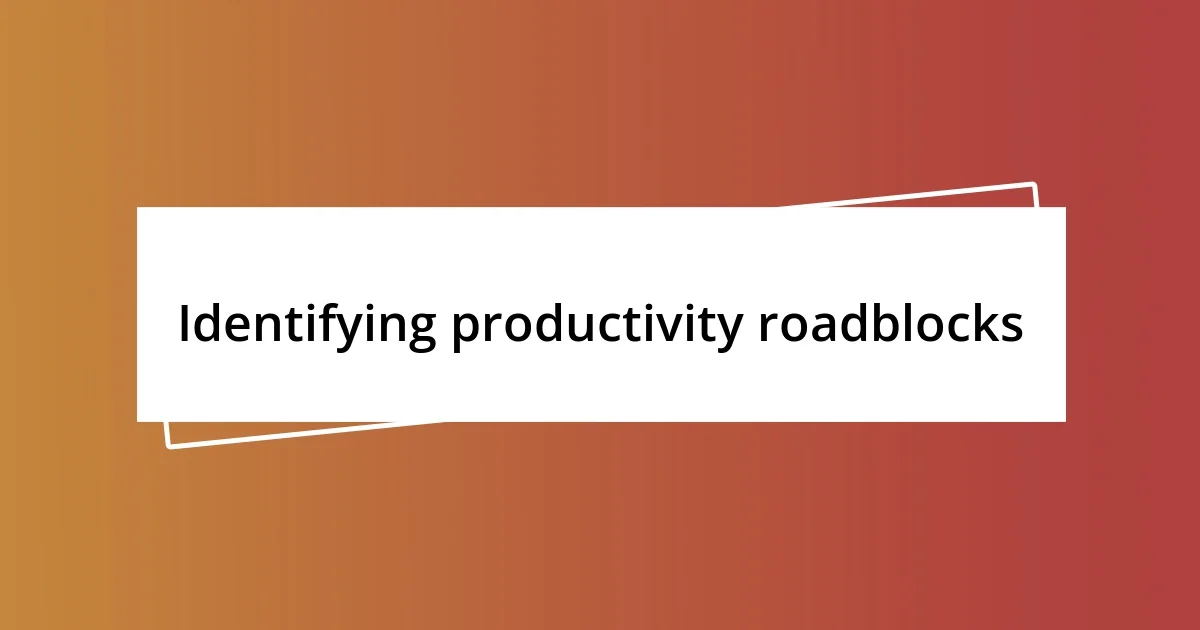
Identifying productivity roadblocks
Identifying productivity roadblocks can be a game changer for anyone in the coding world. For me, a huge roadblock has always been distractions—whether they come from constant notifications or an untidy workspace. I remember a project where I struggled to focus because my desk was cluttered. Once I cleaned it up, I found that I could concentrate far more effectively. Have you ever thought about how your environment impacts your focus?
Another challenge I’ve faced is the tendency to overcommit. Early in my career, I would say yes to every request, thinking it was a good way to showcase my skills. However, I quickly learned that spreading myself too thin led to missed deadlines and lower quality work. Now, I’m more discerning about what I take on, allowing me to devote my energy to projects that truly matter. What about you? Have you ever had to learn the hard way about the importance of setting boundaries?
Lastly, I’ve noticed that not understanding the requirements of a task can derail my productivity. There have been times when I’ve started coding, only to realize halfway through that I wasn’t clear on the goals. This often results in wasted time and frustration. To combat this, I now take time to clarify expectations before diving in, which keeps me aligned and on track. How do you handle unclear project requirements?
| Roadblock | My Experience |
|---|---|
| Distractions | Cluttered workspace affected my focus; cleaning it improved my productivity. |
| Overcommitting | Taking on too much led to stress; learning to say no has been liberating. |
| Unclear Requirements | Misunderstanding tasks wasted time; clarifying expectations helps me stay aligned. |
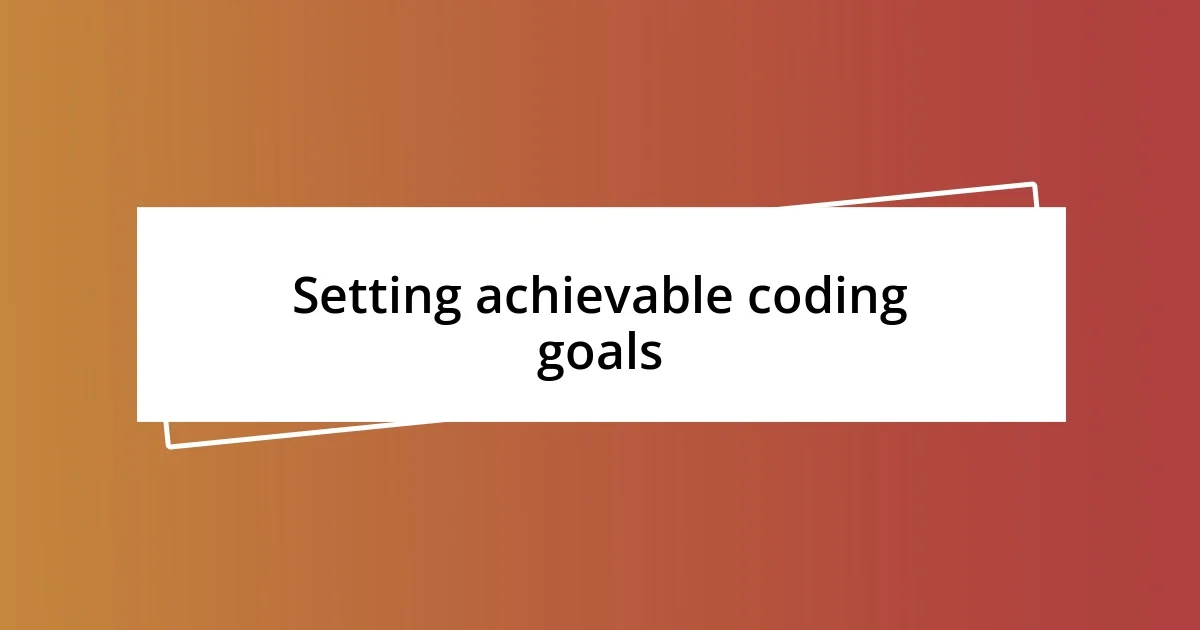
Setting achievable coding goals
Setting achievable coding goals means breaking down your larger objectives into manageable and measurable tasks. I’ve often found myself overwhelmed by ambitious projects, which can lead to burnout and decreased motivation. For example, when I started learning a new programming language, instead of vowing to master it in a week, I set smaller milestones like completing a tutorial or building a simple app. It felt fantastic to celebrate each tiny success along the way, and that momentum kept me pushing forward.
To effectively set your own coding goals, consider the following tips:
- Specificity: Clearly define what you want to accomplish. Instead of vague goals, aim for something like “complete two coding exercises each day.”
- Measurable: Make sure you can track your progress. Use a tool or app that helps you visualize your milestones.
- Realistic: Assess your skills and available time. If your goal is to learn a new framework, give yourself enough time to do it without pressure.
- Time-bound: Set deadlines to keep you accountable. I typically give myself a week for each mini-project.
- Reflective: Regularly review your goals. I’ve found that reflecting on what I accomplished at the end of each week helps refine my focus for the upcoming one.
Remember, the journey of coding is all about growth. Setting achievable goals has transformed not just how I code, but how I enjoy the process. I often share my progress with friends, which adds a layer of accountability and makes it even more enjoyable. How do you celebrate your coding achievements?
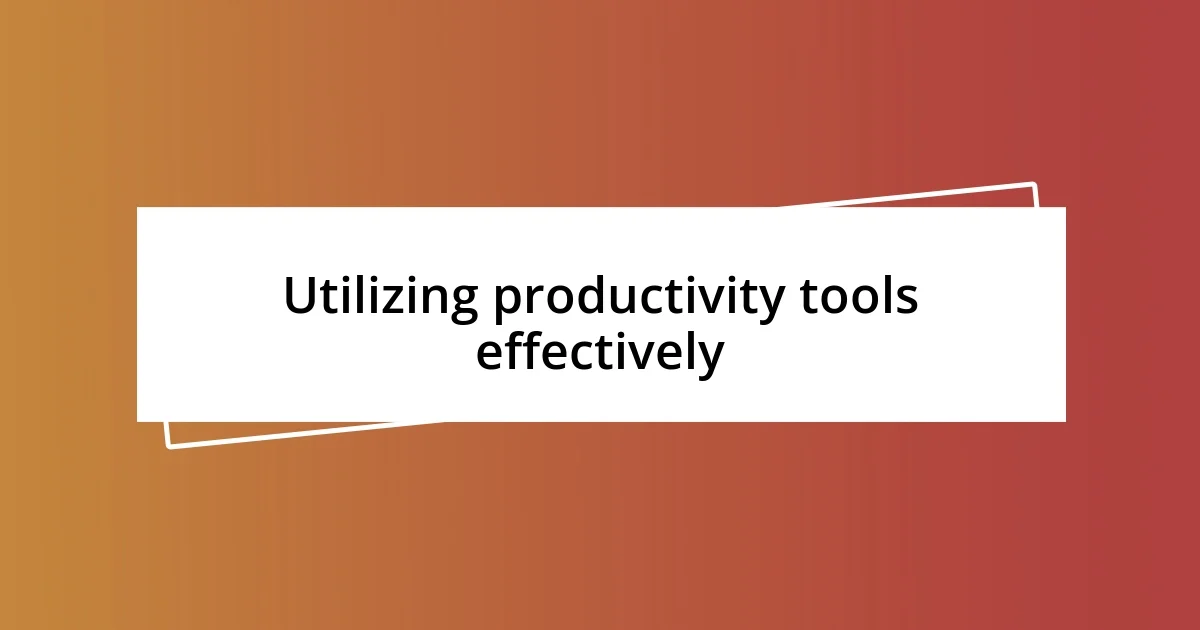
Utilizing productivity tools effectively
Utilizing productivity tools effectively can elevate your coding game significantly. I’ve always found that the right tools streamline my workflow and reduce unnecessary friction. For instance, when I discovered a task management app that integrated with my calendar, it felt like a revelation! Suddenly, I wasn’t just tracking my tasks; I was also able to see how they fit into my day. Have you ever experienced that satisfying click when everything aligns around your schedule?
One tool that truly transformed my productivity is version control, specifically Git. In one of my earlier projects, I made the rookie mistake of working directly on my main branch. If I made a questionable change, it would throw off everything. Now, using branches allows me to experiment without the fear of breaking the code. It’s all about creating a safety net that fosters creativity. Have you tried using version control in your projects yet?
Sometimes, I think it’s not just about the tools themselves but how you use them. Initially, I was overwhelmed by the multitude of features in my coding IDE. It took a while for me to realize that customizing my workspace could save me valuable time. I’ve set up shortcuts for my most-used functions, which has streamlined repetitive tasks. It’s amazing how a few tweaks can make such a difference. How comfortable are you with customizing your tools to suit your needs?
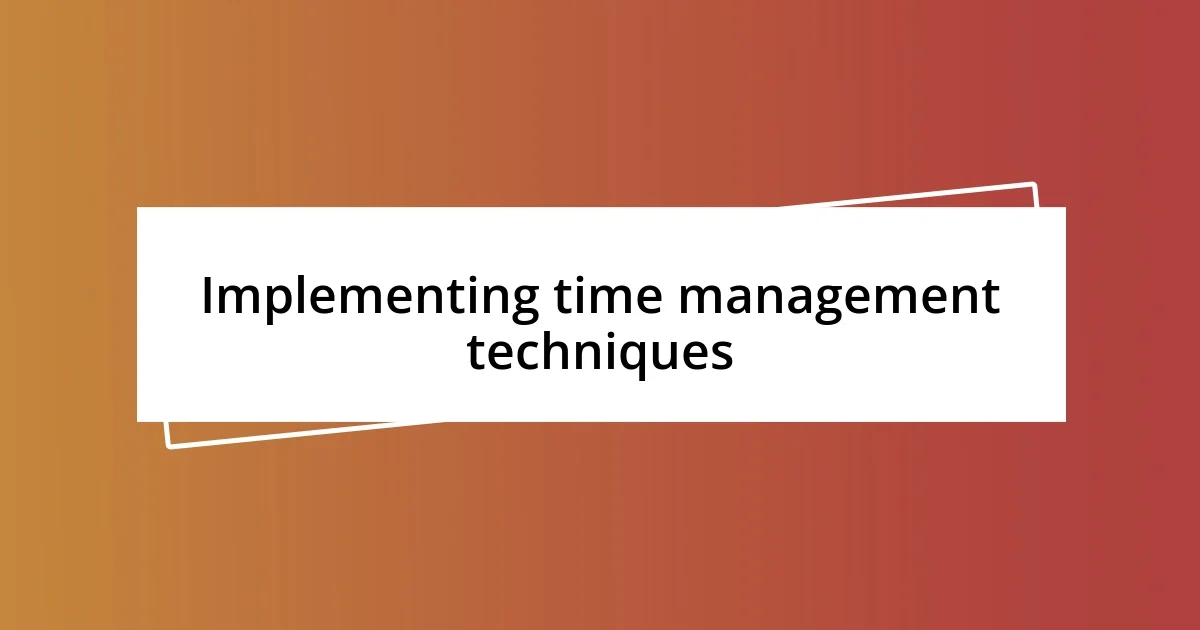
Implementing time management techniques
Implementing effective time management techniques has been a game changer for my coding productivity. I vividly remember the early days when I’d dive headfirst into projects without a plan, only to find myself lost in a sea of deadlines. One method that really resonates with me is the Pomodoro Technique, where I work in short bursts followed by a short break. During those intense 25 minutes, I get so much done, and knowing a break is coming keeps my energy levels high. Have you ever tried breaking your work into timed intervals?
Beyond just techniques, the way I prioritize my tasks has also transformed my approach. I learned to identify high-impact tasks that drive progress, focusing on what truly matters. For instance, when I was working on a critical feature for an app, instead of getting bogged down by minor adjustments, I dedicated my first couple of hours of coding to tackle the most challenging part. It was exhilarating to see significant progress early in the day. How do you decide what to focus on in your tasks?
Scheduling my coding sessions has also played a crucial role in enhancing my productivity. I’ve experimented with different times of the day and discovered that my mind is sharpest in the morning. As a result, I now reserve those precious morning hours for deep focus tasks. It’s like I’m in a rhythm where every keystroke feels purposeful. Do you have a specific time when you feel you code best, or have you considered establishing a routine to enhance your productivity? By aligning my schedule with my natural energy patterns, I’ve significantly boosted my output, making every coding session feel productive and fulfilling.
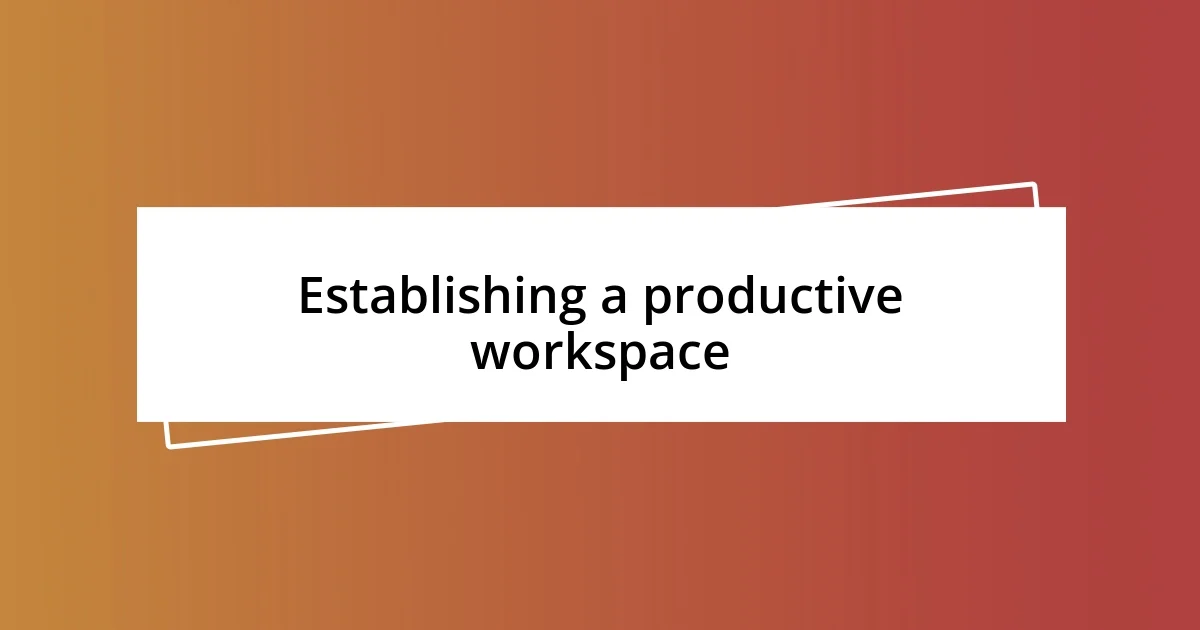
Establishing a productive workspace
Creating a productive workspace has been essential in my journey as a coder. I remember when I was just starting out, my desk was a chaotic mix of papers, gadgets, and empty coffee cups. It wasn’t until I decluttered that I noticed a real boost in my focus. Have you ever tried cleaning up your space? It can be truly refreshing to work in an environment that feels organized and inviting, like a blank canvas for creativity.
Lighting is another factor I’ve come to appreciate deeply. I initially relied solely on overhead lights, which made the room feel cold and uninviting. After switching to warmer desk lamps, I actually found my mood and productivity improving. The soft lighting creates a cozy atmosphere that encourages long coding sessions. How does your workspace lighting affect your mood? You might be surprised at how much difference it can make.
Moreover, personalizing my space has given me a sense of ownership and motivation. I’ve adorned my walls with reminders of projects I’m passionate about and incorporated plants to breathe life into the area. Every time I glance at a photo or a quirky figurine related to my work, it sparks inspiration. Have you thought about adding personal touches to your workspace? Those elements can transform it from merely functional to a space that fuels your passion.
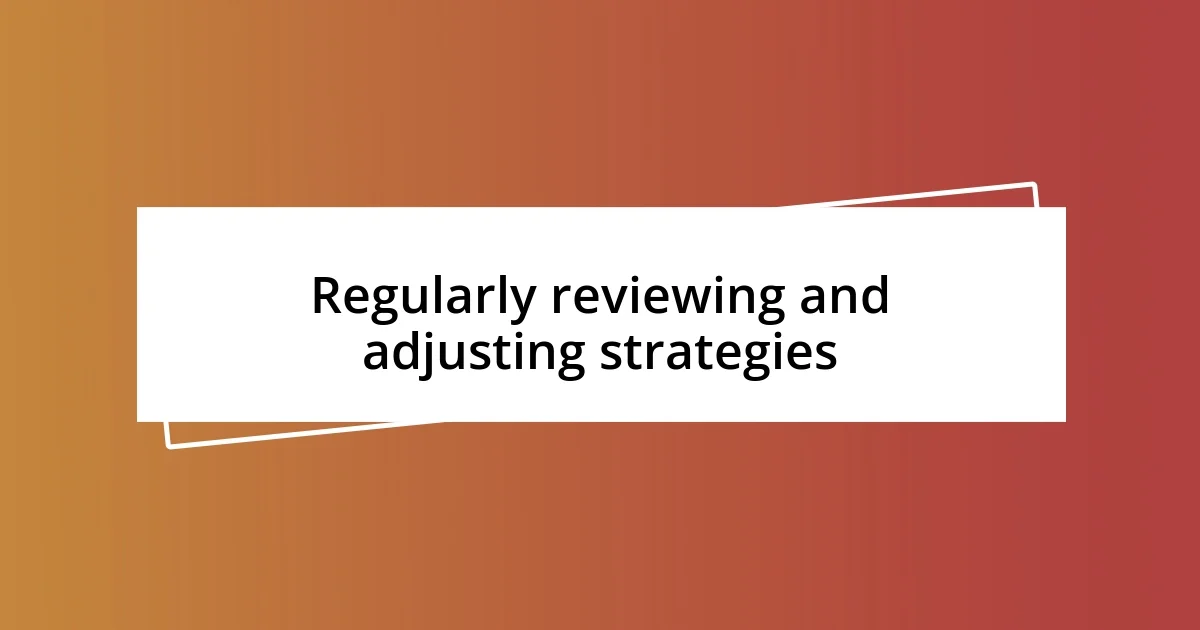
Regularly reviewing and adjusting strategies
Regularly reviewing my strategies has become a critical part of my coding routine. I set aside time each week to reflect on what worked well and what fell flat. For instance, after a particularly challenging week, I realized that I spent too much time on tasks that didn’t significantly contribute to my goals. This insight pushed me to reassess my approach and prioritize tasks more effectively. Have you ever taken a step back to evaluate your own strategies?
As I adapt my methods, I also make adjustments based on my evolving projects. Just last month, I faced a steep learning curve with a new programming language. By regularly checking in on my progress, I identified gaps in my understanding and sought out resources to bridge them. This proactive adjustment not only accelerated my learning but also kept my motivation intact. What adjustments have you made to your coding strategies recently?
Continuous improvement is essential in an ever-changing field like coding. I often compare the evolution of my strategies to fine-tuning a musical instrument; it’s a process of constant refinement. On a bad day, I might find myself frustrated, but recognizing those moments as opportunities for growth has been invaluable. It’s empowering to embrace change in our strategies—what changes can you make today to enhance your productivity?








